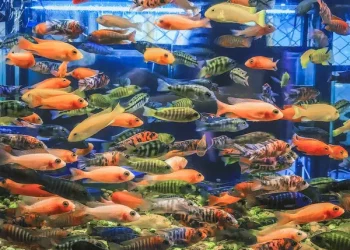Lungfish are unique fish species that have evolved to breathe air as well as extract oxygen from water through their gills. They are capable of surviving in low-oxygen environments, and they can even survive out of water for extended periods. However, one question that often arises is whether a lungfish can drown. In this article, we will explore this topic in detail and discuss the factors that can affect a lungfish’s ability to breathe.
Lungfish Breathing Mechanism:
To understand whether a lungfish can drown, it is essential to understand their unique breathing mechanism. Unlike other fish species, lungfish have lungs, which allow them to breathe air. This adaptation allows them to survive in stagnant, low-oxygen waters that would be inhospitable to most other fish species. However, lungfish also possess gills, which they use to extract oxygen from water when it is available.
Lungfish have the ability to switch between breathing air and extracting oxygen from water, depending on the conditions. When water is available, lungfish will use their gills to extract oxygen from the water. However, when water levels are low or oxygen levels are depleted, lungfish will come to the surface to breathe air.
Can a Lungfish Drown?
Now that we understand how lungfish breathe, we can answer the question of whether they can drown. The answer is yes, a lungfish can drown if it is unable to access air. While lungfish have adapted to survive in low-oxygen environments, they still require air to breathe. If they are unable to access air for an extended period, they will suffocate and die.
Factors Affecting a Lungfish’s Ability to Breathe:
Several factors can affect a lungfish’s ability to breathe, including water quality, water level, and habitat. If water quality is poor or oxygen levels are low, a lungfish may be forced to come to the surface more frequently to breathe air. Similarly, if water levels are low, a lungfish may not be able to access the air it needs to survive.
Habitat is another important factor to consider. In the wild, lungfish inhabit swamps, ponds, and other slow-moving bodies of water. These habitats provide a consistent source of water and air for the lungfish. However, in captivity, it can be challenging to replicate these conditions. If a lungfish is kept in an unsuitable environment, it may not have access to the air it needs to breathe, which can lead to suffocation and death.
How to Ensure Your Lungfish Can Breathe:
To ensure that your lungfish can breathe properly, it is essential to provide them with the right environment and care. Here are some tips to help you ensure that your lungfish can breathe:
- Maintain Water Quality: It is essential to maintain good water quality in your lungfish’s habitat. Regular water changes and filtration can help ensure that oxygen levels remain high.
- Provide Adequate Space: Lungfish require a large amount of space to swim and breathe. Make sure your tank is large enough for your lungfish to move around freely.
- Mimic Natural Habitat: To ensure that your lungfish can breathe comfortably, it is important to replicate their natural habitat as closely as possible. This means providing ample hiding places, plants, and other features that will make your tank more natural.
- Monitor Water Levels: Lungfish require access to air, so it is essential to monitor water levels and ensure that your lungfish can access the surface when needed.
In conclusion, while lungfish are adapted to survive in low-oxygen environments, they still require air to breathe. If a lungfish is unable to access air for an extended period, it will suffocate and die. To ensure that your lungfish remains healthy and happy, it is essential to provide a suitable environment with plenty of oxygen and space to breathe. Regular water changes, proper filtration, and adequate aeration are critical to maintaining the water quality necessary for a lungfish to thrive. Additionally, closely monitoring your lungfish’s behavior and health can help you identify any potential issues early on and take appropriate action to ensure its well-being.
Overall, while lungfish are fascinating creatures with unique adaptations, it is important to remember that they still require proper care and attention to thrive in captivity. By providing them with the right environment, diet, and care, you can enjoy the company of a happy and healthy lungfish for many years to come.
Recommended reading:


























